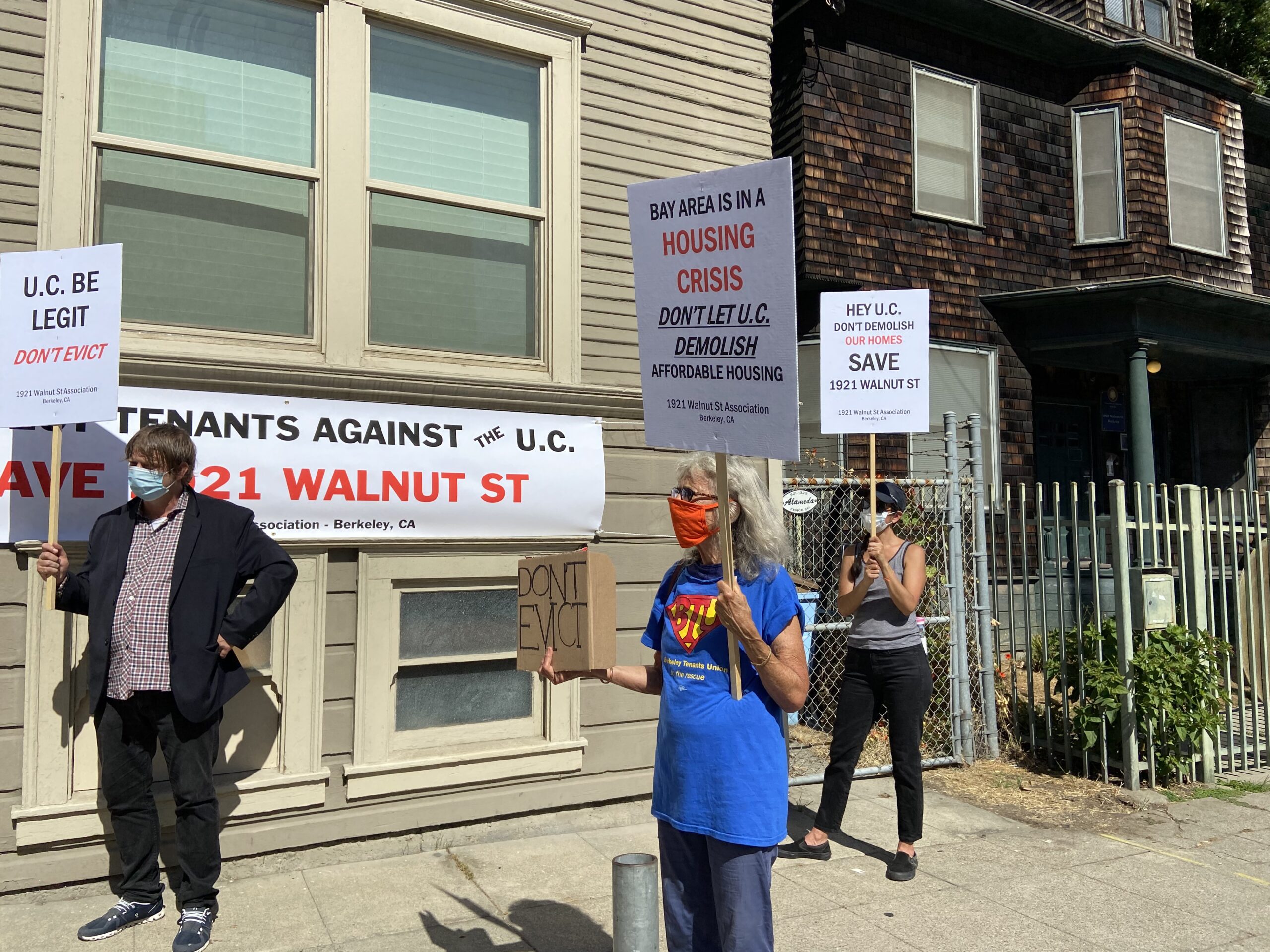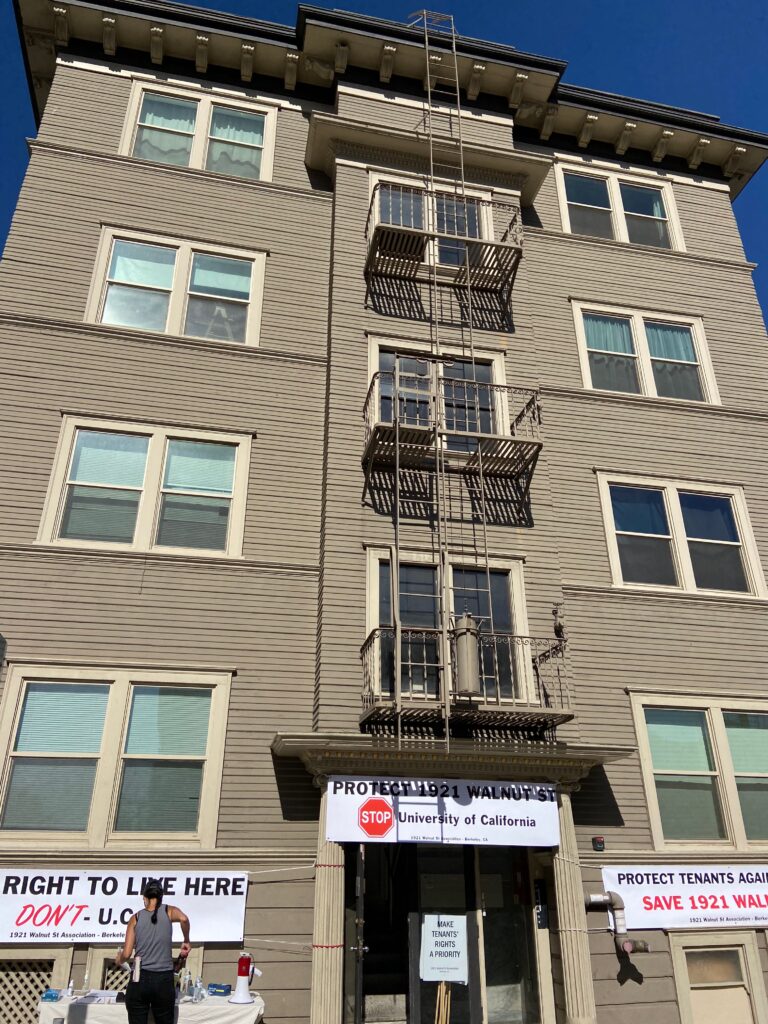
About two dozen people rallied in front of 1921 Walnut St. Monday afternoon against UC Berkeley’s plans to buy and possibly tear down the rent-controlled building to make way for student housing.
By Danielle Kaye (@danielledkaye)
On April 17, tenants of the rent-controlled apartment building located at 1921 Walnut St. in Berkeley encountered an unwelcome surprise: a letter from the University of California Regents stating that they may be forcibly displaced from their homes.
It wasn’t an eviction notice, but rather, a vague statement of the university’s intent to buy the property and eventually redevelop it for student housing.
“It was in the middle of a pandemic — the city of Berkeley, state of California, much of the country was in a shutdown. So we were ordered to stay at home,” said Natalie Logusch, has been living in the apartment complex for about 10 years. “It was a Friday night, and I remember walking up the steps and seeing envelopes mailed to all the doors, and feeling a little weird about that, and reading the letter.”
“It was utterly confusing, and frankly very intimidating,” Natalie said. “And seeing that UC letterhead — you know, UC has incalculable resources, money, power. What are we gonna do against them? And that letter — it wasn’t asking us, ‘Oh, what do you guys think? We’re thinking of changing your neighborhood, changing your building.’ They put us on notice. It was like, ‘You’re going to be displaced, you’re going to have to move. And here’s what’s going to happen.’ If I have to move, I’m going to lose my home, my work, my friends, my community. Everything I built here in ten and a half years is just gone in an instant.”
Devon Riddick first moved into his apartment in the rent-controlled complex in 1989. He was a student at Berkeley High School at the time.
“The affordable rent that we have here is making it possible for us to stay here. So if we’re displaced, then we’ll have to move into a more expensive apartment, and we probably won’t be able to live here in Berkeley anymore,” Devon said.
UC Berkeley is a state institution, so it doesn’t have to abide by the city of Berkeley’s rent control measures that protect against unwarranted rent increases and evictions. The university also isn’t required to build new rent-controlled units to replace the ones they might demolish.
“UC is exempt from any local control — both zoning and housing. So they have a state exemption,” said John Selawsky, a Berkeley Rent Board commissioner and member of the steering committee of the Berkeley Tenants Union.
John, along with the tenants of 1921 Walnut St., organized a protest against the UC’s plans Monday afternoon, in front of the apartment building.
“The first ask — and we’re not asking anything other than this right now — is: don’t buy the building, or if you buy the building, don’t demolish the building. Just let the tenants remain here, maybe until they attrition out. That would be a solution for these tenants,” John said.
Senate Bill 330, known as the Housing Crisis Act of 2019, is a state law aimed at removing local barriers to housing production. “There is the Housing Crisis Act of 2019, which we think applies. There may be a legal argument. But that would have to be adjudicated. We’ll see what happens,” John explained.

The protest drew support from city officials Berkeley Mayor Jesse Arreguin and Councilmember Kate Harrison, who sent representatives from their offices to voice concern about the UC’s proposed acquisition of the property.
Stephen Elgstrand spoke on behalf of the mayor about what he characterized as the university’s disregard for the city’s ‘three P’s’ of affordable housing: production, preservation, and protection.
“So when it comes to the case of 1921 Walnut St., the university is following one the P’s, production, but it’s doing so at the expense of the other two P’s: preservation and protection,” Stephen said. “We simply do not accept that.”
According to a statement sent to KPFA from Kyle Gibson, the communications director for UC Berkeley’s real estate development arm, the university has entered into a purchase contract with the owners of 1921 Walnut St., but the sale has not closed. He said there is “no imminent action planned regarding the property, and residents can plan on remaining in the building for at least several months,” adding that the campus would prepare relocation payouts for the residents if it moves forward with demolition.
But Kim Romero, one of the tenants, says they’ve been largely left in the dark about the university’s plans.
“It felt like it wasn’t very transparent with their communication with us. We had to find out most of the information by Googling and going online,” Kim said.
Kim says she found out about the university’s so-called Gateway Student Housing Project on her own. The plan is to build student housing on the entire block, demolishing buildings adjacent to 1921 Walnut St. that the university already owns. While the protesters acknowledged the dire need for more student housing, they say student housing shouldn’t come at the expense of affordable housing for the broader Berkeley community. Andrea Henson from the Eviction Defense Center says this one case raises larger questions about the UC Regents’ role in protecting affordable housing statewide.
“This is the foundation of the exact movement that’s happening across the state and across the country — to prevent displacement,” Andrea said. “There’s no reason to tear this down. We have all this commercial space that the UC could use.”
This story aired on UpFront on July 1, 2020.

